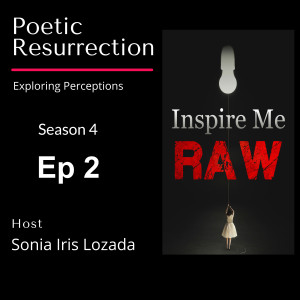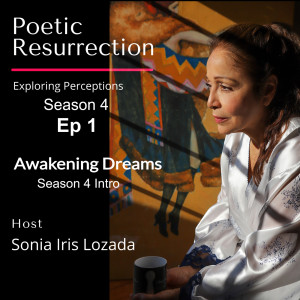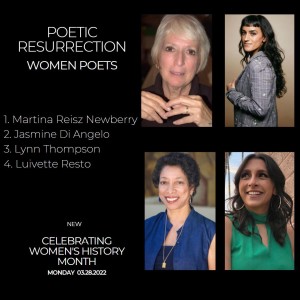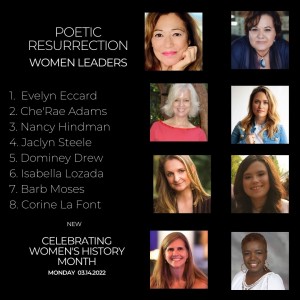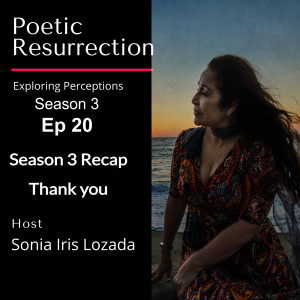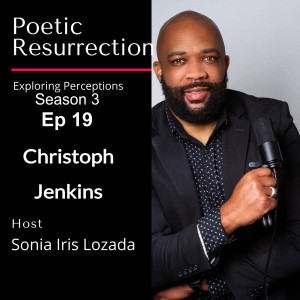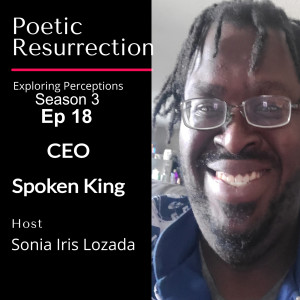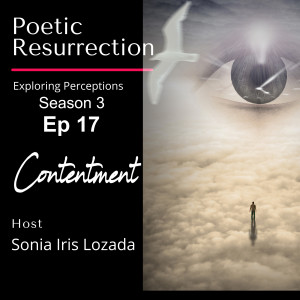Monday Apr 18, 2022
In continuing the celebration of poetry month. Poetic Resurrection will have two poet interviews. We again will welcome Martina Reisz Newberry and a newcomer to our podcast, Diana Rosen.
In this episode, I will discuss and read a few poems from Inspire Me: Perception. Inspire Me: Perception was recently re-edited and we will release a compilation book of the first two Inspire Me books this month with a preview of five poems from my upcoming book Inspire Me: Awakening Dreams. Enjoy!
The poems in this episode include “Silhouette”—a poem about a traumatic experience “Food”—a poem about my love of food and how a loving family makes fun of you and currently the most popular poem “Tomorrow” about how we view life and rethinking our perceptions. Various lines from “Tomorrow” have been quoted by several websites.
Silhouette
A dark shadow appears—soul shakes, the body suspends. A story of an altered spirit who’ll manifest soon in the deepest of night. Shadow essence of two-week visit encompasses my thoughts and sleep. If present, she’ll be safe. Who do you speak of, spirit? A man’s silhouette in the early morning as the streetlights gleam upon glistening muscle tone. The sun peeks as my roommate dreams, unconscious of his gaze. In the darkness, a gun rises in his hand, aims at roommate’s head. Silence takes over as the smoke aura scars her fate. Dream propels my slumber, and I go to her room. If I’m present, she’ll be safe repeats. Sunlight dances on my face as the night’s story whispers away. She awakens, “Had that dream again, didn’t you?” “Yes.” Three full moons calendar the sky. Gotham called for her home—She’s safe. Chitown childhood friends summer evening visit—Sunset Strip. Summer heat, sleep half nude as evening completes at midnight. Vocal and joyful friends jest of a man at the window where the drapes bellow. Amusement drains the night as the muscles gleaming silhouette appears. She runs into my bedroom, gun points at third eye—forced out of comfort into the lifeless living room. Essence extends my body as I guard the front door. “Think you’re going somewhere?” He shouts. Gun points for me to sit by piano. The silent melody piano bench where I abide. “On the floor,” he casts me as he bares my skin from sheet. Little sister weeps and window slams, fearing discovery of his carnal acts. Guilt survival mission defuses the present. Escaping—leap two steps—first landing. Leap again, gun at head. Blinding movie screen of my life flashes, steals my sight. Land on corner of step and propelled onto the ground. Not dying, not tonight! Street or parking lot? A straight shot I will not be as I hide beside cars until I can jump a concrete fence that divides the building. Footsteps dissipate. Blood curdling screams echo in the distance. I climb many staircases and a man stands with two dogs. “Please call the police,” I beg. “I think my friend’s dead.” His girlfriend’s pink robe drapes a childhood fear. We hide. Police state, “Stay inside.” Helicopter’s beaming lights—Treble sirens and watchful dogs ease chaotic street. An hour-and-a-half, a knock. Police state, “He escaped—assaulted another woman and stole her car.” Friends approach in a cloud of disbelief, sobbing. They heard my fall, calling—No answer—Saw my death in his hands. Police, “He’ll return.” Neighbor held us safe, and we slept on her floor. My scarred friends left the next day. Never went back. He never paid. Warning from silhouette, but I didn’t understand. Premonition, and it’s real impact. Checking doors and windows for a year, but I know I saved my friends because—I was there.
Food
ReminiscingFood stories that my family tellsAbout behaviorDon’t remember, age three or four
Learned to walk, learned to climbKitchen chair, telephone booksGod forbid family wouldBuy a step ladder to make my life easier
An old refrigerator (not old back then)Lever—jump up and pull downSister wonders why fridge is ajarOpens door—Surprise, it’s me!
Sitting on a shelf eating an appleShe grabs me, fights to get fruitTug of war ensuesShe wants a chewed apple?
Stomping away (I had such an attitude)Fruit in hand—I wonSister retells story as family laughsI am offended by their laughter
Rope around stove, fridgePadlock on pantry? Chocks for candy!Where’s the fruit?Watch fire in stove—I love fireplaces
Upset, storm off to yellow vinyl 50’s sofaJump up and slide back downJump up again and againOh well, I’ll throw myself on floor
Crying because I’m a miffed childCheck to see if they’re watchingMom comes over and hugs meSit on the big vinyl sofa—Finally!
Tomorrow
If I were to die tomorrowWould I have organized my homeWould I have left my paperwork in orderWould I have made it easier for my familyIf I were to die tomorrowWould I have followed and completed my dreamsWould I have loved the way I wanted to loveWould I have visited the world like I wanted toIf I were to die tomorrow Would I have told those that I loved that I love them Would I have seen the beauty in my own life Can I say that I lived my life to its fullest
If I were to die tomorrowWould I have lived today Would I have loved differently Would I have felt my life was complete If I would die tomorrow A sadness would be thereTo know I wasted so much timeIf I were to die tomorrowI would make the unknown I’d face the unknown I was so afraid ofAs I choose my life today with strength and joy
Music
Relaxing Piano Music by Kevin MacLeod
Link: https://incompetech.filmmusic.io/song/4273-relaxing-piano-music
License: https://filmmusic.io/standard-license













